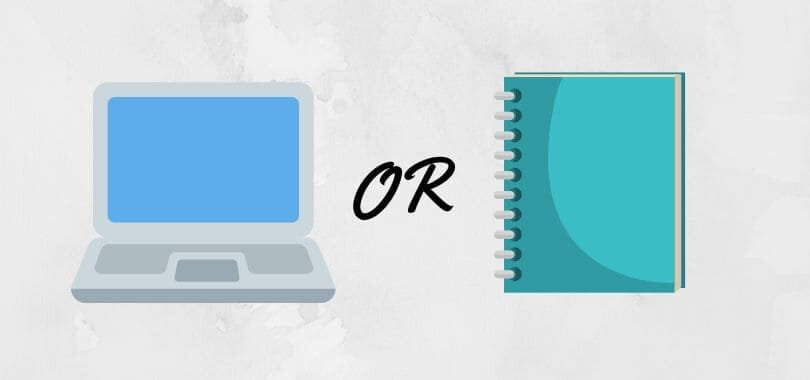The laptop is used with more and more frequency in college classrooms, but what about the classic notebook? Is typing better than writing by hand?
Professors say that laptops are a liability and distraction in class. However, students report that laptops are more beneficial than traditional note-taking. So who is right? What are the pros and cons of using a laptop versus a notebook?
Laptops
Pros:
- You can type faster than you can write
Some college professors talk fast. More than once you’ll be rushing to write down the notes on a slide and hear a choir of groans from the entire lecture hall when the prof switches to the next slide. Typing increases your chances of getting it all down.
- It’s organized
On a laptop, you can have your notes, the digital syllabus, the calendar, and resources all neatly organized in one place. You don’t have to worry about toting around different folders overstuffed with printed pages, or binders filled with research. Laptops tend to be pretty convenient.
If you have a friend who’s sick and misses a class, it’s incredibly easy to email them the notes, rather than give them your whole notebook or tearing out pages that can be easily lost. Or if you have a question for your professor about what you covered in the lecture, you can send them an email and quote what you wrote down.
- Copy + Paste
Making digital flashcards? Copy + paste from your notes. Need to quote something in your research paper? Copy + paste. Recapping notes for a test and you don’t want to re-write? Copy + paste.
Cons:
- Distractions
Let’s be honest, it’s very easy to switch over from dutifully writing lecture notes to scrolling through Facebook or Twitter. (I’m guilty of it, too.) Having access to the internet is both a blessing and a curse, but during class time, it’s more of the latter. Laptops offer temptations that will detract from the learning, not just for you but for people around you. If a person sitting one row in front of you switches tabs over to Buzzfeed or something odds are your eyes will go straight to it, even if only for a moment.
- Verbatim note-taking
Believe it or not, writing down word-for-word what the professor says is not super helpful. Taking down dictation isn’t engaging, but rather passive–so you’re not absorbing as much info as you can. (More on this later).
- Technical difficulties
Computers can glitch out at the worst times. Getting the blue screen of death in the middle of class can be both extremely stressful and disheartening. Crashing leads to lost notes and lost time. Internet connections will be spotty or slow. What can go wrong, probably will go wrong at some point.
Notebook
Pros:
- Handwriting improves memory
Studies show that writing notes by hand will increase memorization and recollection of that information, which is pretty darn helpful for tests.
- Selective note-taking
Since you can’t write as fast as you type, traditional note-takers have to pick and choose which pieces of information to write down. That means you’re actively listening, engaged with the material, and able to root out what’s really important. You’ll end up knowing the material better.
- Illustrative thoughts
Need to underline or star something to show emphasis? You can do that. Need to sketch out a table or a figure to label? You can do that. Need to jot some extra notes in the margins and draw an arrow to the relevant section? You can do that. Notebooks offer more free-form customization to your note-taking.
Cons:
- Slow notes and hand-cramps
We’ve already said it: you type faster than you can write. While this may actually sometimes be an asset to note-taking, sometimes you’re just too slow. Even if you’re writing at a breakneck speed, your hand can get sore quickly and then note-taking really becomes a pain.
- Bad handwriting
Whether because of the speed or the lack of practice due to typing being more common, bad handwriting can render any batch of notes hard to read. While you’re focusing on deciphering your scrawl, you’re not focused on the actual material.
- Doodling
Have pen, will doodle. If the lecture is dull or the professor’s voice is monotone, it might be tempting to sketch out some random picture or design. (I was/am a notorious doodler, my notebooks were filled with crazy drawings in the margins).
So which is better?
Though there are pros and cons to each method, studies lean towards recommending a notebook over a laptop. Mueller and Oppenheimer took a comprehensive look at three separate studies, to test which was better. Their results suggested that students who took notes by hand in a notebook performed better on conceptual tests, have increased academic performance, and process the information more deeply than their laptop note-taking counterparts.
So if we had to suggest one form over the other, we’ll side with the scientists and professors: Take hand-written notes in a notebook.







